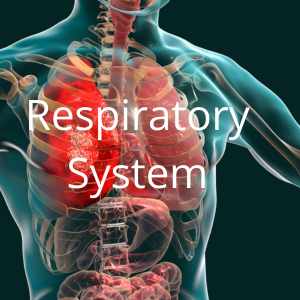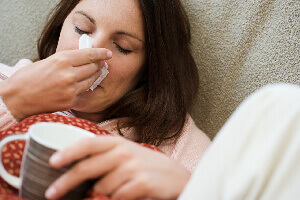Disorders and Overview
I think everyone would agree that we can go several days without water, and over a week without food, but only a few minutes without oxygen. I don’t know about you, but to me this makes our respiratory system extremely important! The importance of oxygen to our bodies is crucial and it is our respiratory system that performs the function of respiration or breathing. Breathing is defined as the taking in of oxygen through inhaling, and the discharge of carbon dioxide through exhaling.
 The respiratory systems main function is breathing. We can’t exist without it, yet how we breath doesn’t really entail an in depth discussion. So I am going to focus on the health of our respiratory systems.
The respiratory systems main function is breathing. We can’t exist without it, yet how we breath doesn’t really entail an in depth discussion. So I am going to focus on the health of our respiratory systems.
The organs that make up the respiratory system are the organs that are responsible for the exchange of gases. These organs include the:
- Nose
- Pharynx
- Larynx
- Trachea
- Bronchi
- Lungs
The oxygen we breathe in, is transferred by the alveoli. The alveoli are the tiny balloon like sacs at the end of the bronchioles. The capillaries (which are very tiny blood vessels) then carry the oxygen throughout our circulatory system to our cells. The Chi Machine, when focusing on deep breathing during its movement, often times benefits the respiratory system.
There are many different diseases that can affect the respiratory system. Some of these diseases are infectious and some of them are not.
Some non infectious respiratory system disorders include:
- Asthma
- Hay fever
- Allergic rhinitis (which is an inflammation of the nasal passages
- COPD (chronic obstructive pulmonary disease)
- Chronic bronchitis
- Common cold
- Sinusitis
- Croup
- Influenza / Flu
- Acute bronchitis
- Pneumonia
Some statistics on respiratory disorders and diseases
According to the CDC there are roughly 158,000 deaths per year from lung cancer, 125,000 deaths per year from COPD, 52,000 deaths per year from pneumonia, anywhere from 3,000 to 49,000 from the flu, and 3,400 from asthma. More startling is that globally 1.5 million children under the age of 5 die from pneumonia each year. Also, according to the American Lung Association 438,000 deaths occur per year related to smoking. Smoking affects every organ in the body.
The symptoms can be very similar for many different respiratory diseases. They can include:
- Sneezing
- Stuffy or runny nose
- Sore throat
- Coughing
- Watery eyes
- Mild headache
- Mild body aches
- Post nasal drip
- Wheezing
- Fever
It is very easy for the respiratory tract to get invaded. It starts by someone being sick and sneezing. We breath in the germs through our nose and they can eventually be carried inside our respiratory tract. Once the germs are inside, the immune system kicks in and produces white blood cells to help fight off the germs. Coughing, sneezing and a runny nose, help the body to remove these white blood cells, germs, mucous, and other by products of the infection.

Some natural health experts feel that the common cold is merely the body fighting off and getting rid of the infection. If that is true, you might think that taking medication to suppress the symptoms of a respiratory infection or the common cold could possibly cause you to get sicker because you are not allowing the body to get rid of the germs. I tend to feel this way when I am sick and try to ride the wave of the fever and carry around my box of Kleenex. I have often thought that may be why it has been so difficult to figure out how to get rid of the common cold. You also want to be conscious of over treating yourself when you are sick because there has also been rising concern about the overuse of antibiotics and antibiotic resistance bacteria. I know my doctor is much more cautious in prescribing an antibiotic and wants to make sure it is a bacterial infection and not a virus.
Prevention is always best
- Don’t Smoke. If you smoke, do whatever it takes to quit. I quit back in 1997 and know how difficult it is to quit! The American Lung Association has resources available to assist you. Quitting smoking also can increase your stress, so you may want to supplement with a good Multi Vitamin or B-Complex. I also found it helpful when I quit to avoid, sugar and alcohol for the first week.
- Wash your hands. This simple habit is well worth developing
- Clean hard surfaces regularly like doorknobs, steering wheels, and countertops
- If you have to cough or sneeze, do it in a tissue or into your elbow or sleeve
- If you are sick – STAY HOME
- Make sure you are getting enough sleep
- Eat your fruits and vegetables
- Drink plenty of water
- Exercise – great for moving your lymphatic system and releasing stress.
Prevention, nutritional, and natural support is what makes our bodies strong. You can view several herbs and supplements from Nature’s Sunshine Products via our Respiratory Support Product Page. My favorite for helping the body deal with allergies is Histablock. When I start coming down with a cold I grab CC-A. I always have Sinus Support and ALJ on hand to help me with that congested feeling. For supporting healthy lungs, Lung Support and Bronchial Formula work well.
Stop Smoking Resources
Get the American Cancer Society’s Guide to Quitting Smoking.
Visit the American Lung Association. Every year in the U.S. over 392,000 people die from tobacco-caused disease, making it the leading cause of preventable death. Learn what can be done to stop smoking and break your cycle of addiction. Also help them educate our youth on the hazards of smoking.
Visit the Center for Disease Control for support in quitting, including free quit coaching, a free quit plan, free educational materials, and referrals to local resources.
References: American Lung Association, CDC, Ohio State Medical Center
